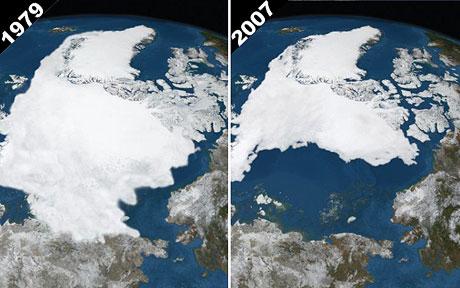CLIMATE CHANGE INFORMATION AND LINKS
|
Published on Monday, October 20, 2008 by The Telegraph/UK
Climate Change Is 'Faster and More Extreme' Than Feared
Climate change is happening much faster than the world's best scientists predicted and will wreak havoc unless action is taken on a global scale, a new report warns.
by Paul Eccleston
'Extreme weather events' such as the hot summer of 2003, which caused an extra 35,000 deaths across southern Europe from heat stress and poor air quality, will happen more frequently.

Arctic sea-ice in September 1979 and 2007, showing the biggest reduction since satellite surveillance began. (Photo: Fugro NPA Ltd)]Arctic sea-ice in September 1979 and 2007, showing the biggest reduction since satellite surveillance began. (Photo: Fugro NPA Ltd)
Britain and the North Sea area will be hit more often by violent cyclones and the predicted rise in sea level will double to more than a metre, putting vast coastal areas at risk from flooding.
The bleak report from WWF - formerly the World Wildlife Fund - also predicts crops failures and the collapse of ecosystems on both land and sea.
And it calls on the EU to set an example to the rest of the world by agreeing to a package of challenging targets for cutting greenhouse gas emissions to tackle the consequences of climate change and to keep any increase in global temperatures below 2C.
The agency says that the 2007 report from the Intergovernmental Panel on Climate Change (IPCC) - a study of global warming by 4,000 scientists from more than 150 countries which alerted the world to the possible consequences of global warming - is now out of date.
WWF's report, Climate Change: Faster, Stronger, Sooner, has updated all the scientific data and concluded that global warming is accelerating far beyond the IPCC's forecasts.
As an example it says the first 'tipping point' may have already been reached in the Arctic, where sea ice is disappearing up to 30 years ahead of IPCC predictions and may be gone completely within five years - something that hasn't occurred for a million years.
It could result in rapid and abrupt climate change rather than the gradual changes forecast by the IPCC.
The findings include:
* Global sea level rise could more than double from the IPCC's estimate of 0.59m by the end of the century.
* Natural carbon sinks, such as forests and oceans, are losing their ability to absorb CO2 from the atmosphere faster than expected.
* Rising temperatures have already led to a major reduction in food crops resulting in losses of 40m tonnes of grain per year.
* Marine ecosystems in the North and Baltic Sea are being exposed to the warmest temperatures measured since records began.
* The number and intensity of extreme cyclones over the UK and North Sea are projected to increase, leading to increased wind speeds and storm-related losses over Western and Central Europe.
The report was issued to coincide with a meeting of EU Environment Ministers today to discuss new laws aimed at tackling climate change. Some countries, including Italy and Poland, have already rejected proposals for higher cuts in emissions claiming they are unaffordable and unrealistic when many countries are facing recession.
The UK is the only country so far to commit to a legally binding 80 per cent cut in emissions by 2050 which the Government claims can be achieved by a switch to renewable energy sources - such as wind and wave - combined with a new generation of nuclear power stations.
In the report WWF urges the EU to commit to a reduction target of at least 30 per cent below 1990 levels by 2020 without relying on offsetting overseas and to provide financial support so developing countries can cut their own emissions and prepare for unavoidable impacts of climate change.
WWF-UK's Head of Climate Change, Dr. Keith Allott, said: "Climate change is a major challenge to the future of mankind and the environment, and this sobering overview highlights just how critical it is that EU environment ministers, who are meeting today to discuss EU legislation to tackle climate change, commit to a strong climate and energy package, in order to ensure a low carbon future.
"If the European Union wants to be seen as leader at UN talks in Copenhagen next year, and to help secure a strong global deal to tackle climate change after 2012, then it must stop shirking its responsibilities and commit to real emissions cuts within Europe."
The report has been endorsed by Professor Jean-Pascal van Ypersele, the newly elected Vice Chair of the IPCC, who said: "It is clear that climate change is already having a greater impact than most scientists had anticipated, so it's vital that international mitigation and adaptation responses become swifter and more ambitious."
© 2008 The Telegraph
|

